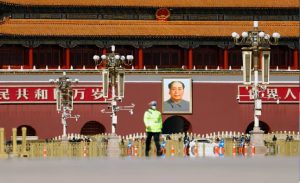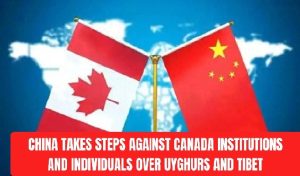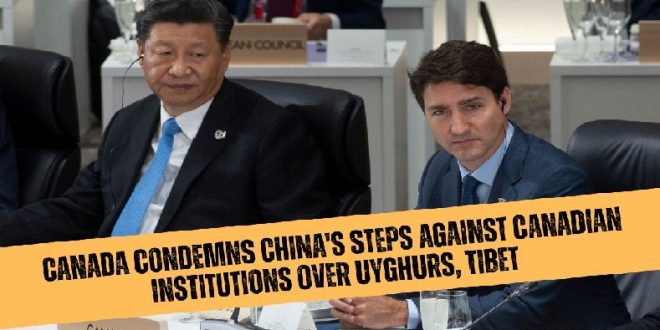27-12-2024
OTTAWA: The Canadian government condemned China on Tuesday for taking steps against two Canadian institutions and 20 people involved in human rights issues concerning the Uyghurs and Tibet.
China announced the measures, which included asset freezes and bans on entry, on Sunday. Its targets included the Canada-based Uyghur Rights Advocacy Project and the Canada-Tibet Committee, China’s foreign ministry said.
 “Global Affairs Canada expresses solidarity with the members of the Canadian Tibet Committee and the Uyghur Rights Advocacy Project and condemns the decision by the Chinese Government to punish them for speaking out for human rights,” the Canadian government said in a statement.
“Global Affairs Canada expresses solidarity with the members of the Canadian Tibet Committee and the Uyghur Rights Advocacy Project and condemns the decision by the Chinese Government to punish them for speaking out for human rights,” the Canadian government said in a statement.
The Canadian statement urged China to respect its obligations under international law while also urging Canadians to exercise a high degree of caution in China due to the risk of arbitrary enforcement of local laws.
Rights groups accuse Beijing of widespread abuses of Uyghurs, a mainly Muslim ethnic minority that numbers around 10 million in the western region of Xinjiang, including the mass use of forced labour in camps. Beijing denies any abuses.
China seized control of Tibet in 1950 in what it describes as a “peaceful liberation” from feudalistic serfdom. International human rights groups and exiles, however, have routinely condemned what they call China’s oppressive rule in Tibetan areas.
“The Government of Canada will not tolerate any threats, acts of violence or harassment of people in Canada or their family and friends because of their political opinions or to silence dissenting viewpoints,” the Canadian government said.
Meanwhile, China said it was taking countermeasures against two Canadian institutions and 20 people involved in human rights issues concerning the Uyghurs and Tibet.
The measures, which took effect on Saturday, include asset freezes and bans on entry. The targets include the Canada-based Uyghur Rights Advocacy Project and the Canada-Tibet Committee, China’s foreign ministry said on its website on Sunday.
 Rights groups accuse Beijing of widespread abuses of Uyghurs, a mainly Muslim ethnic minority that numbers around 10 million in the western region of Xinjiang, including the mass use of forced labor in camps. Beijing denies any abuses.
Rights groups accuse Beijing of widespread abuses of Uyghurs, a mainly Muslim ethnic minority that numbers around 10 million in the western region of Xinjiang, including the mass use of forced labor in camps. Beijing denies any abuses.
“I accept it (the sanctions) as a badge of honor,” said Mehmet Tohti, executive director of the Uyghur Rights Advocacy Project, in an interview on Monday. “What we did here in Canada has started to resonate in China and it starts to hurt their plan or programs and for that reason, I see this as a sign of accomplishment,” Tohti added.
China seized control of Tibet in 1950 in what it describes as a “peaceful liberation” from feudalistic serfdom. International human rights groups and exiles, however, have routinely condemned what they call China’s oppressive rule in Tibetan areas.
The Canada-Tibet Committee said in a statement that the sanctions strengthened its resolve to continue advocating for Tibet. It called on the Canadian government to ensure those who have had sanctions placed on them do not come to harm within Canada.
China said it was freezing property of the two institutions within China. It said it was also freezing the property in China of 15 people in the Uyghur institution and five on the Tibet committee, as well as banning them from entering China, including Hong Kong and Macau.
Calls to the Canadian embassy in Beijing went unanswered. Media did not receive an immediate response from Global Affairs Canada. (Int’l News Desk)
 Pressmediaofindia
Pressmediaofindia




